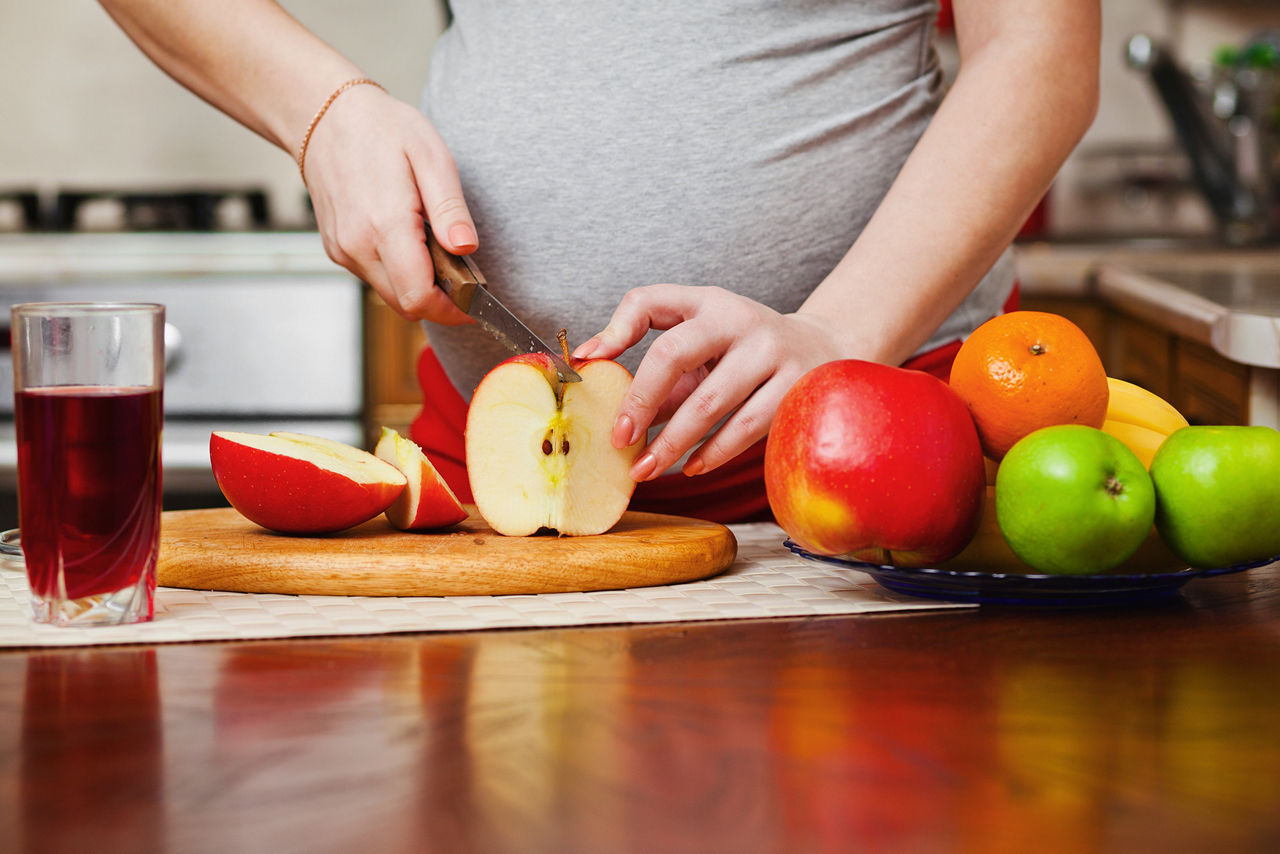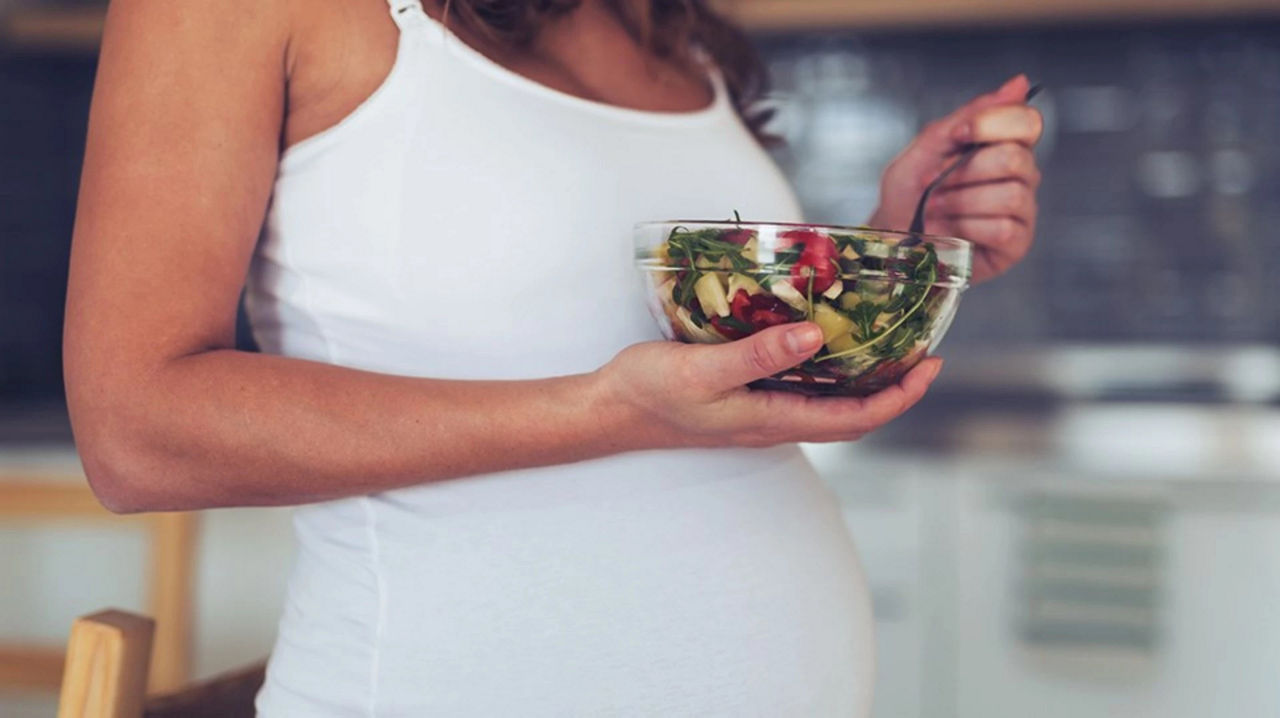Experts now believe that pregnancy diet is likely to influence an unborn baby’s developing immune system, and reduce the likelihood of allergic disease in childhood.In particular, vitamins A and D, folic acid and omega 3 have been linked to immune function and may help your baby to develop immunity and resilience that will stay with them for life.
Pregnancy nutrition and baby immune system

The link between immunity and allergy
We’ve long understood the role of vitamins and minerals in infant development; we know that calcium is needed for healthy bone growth, iron is essential for brain development, and vitamin C helps skin and tissue to form. But scientists are now turning their attention to the link between pregnancy nutrition and infant immunity.
Deficiencies of vitamins, minerals and fats in pregnancy have been linked to poor immune function in babies and children. Allergies are on the rise: over the past two decades, the incidence of allergic diseases has increased dramatically worldwide, particularly in the young.
Thankfully, the more we understand about the baby immune system and the factors affecting it, the more we can do to strengthen immune function and resilience, and reduce the prevalence of allergies.
Pregnancy food and immunity
The Western diet – in which red meat, sugar, butter, vegetable oils, refined grains and processed foods feature heavily – has been linked to an increase in allergies among children. The Mediterranean diet, however – rich in fruits and vegetables and with less dairy and red meat – is associated with a reduced risk of allergy development.
Specifically, it’s suggested that a healthy pregnancy diet with an increased intake of particular types of fish, fruit, vegetables and foods rich in omega-3 and vitamin D may reduce the risk of childhood allergies such as eczema, wheeze, asthma and allergy sensitivities.
Nutrients to support baby immunity
Vitamin D
Evidence suggests that a lack of Vitamin D in pregnancy may be associated with the development of childhood asthma. Getting the right amount of vitamin D from natural sources can be difficult – it’s only available from a few foods and mostly produced in response to sunlight. That’s why pregnancy supplements contain vitamin D, and may be the most reliable source. Learn more about the role of vitamin D in pregnancy and how you can up your vitamin D intake.
Vitamin A
As well as supporting the development of your baby’s lungs, eyes and skin cells, vitamin A also contributes to the development of your baby’s immune system.But too much vitamin A can be harmful so you should avoid foods like pâté and liver. Instead, include foods which contain safe levels of vitamin A such as orange-coloured fruits and vegetables, dairy and eggs.
 Eating little and often is also very important
Eating little and often is also very important
Omega-3
Making sure your pregnancy diet includes omega-3 polyunsaturated fatty acids (fish oil) may help to reduce sensitisation to common food allergens in the first year of life. Oily fish such as mackerel and salmon are good sources of omega-3, but stick to 1-2 portions per week. If you’re thinking of taking a fish oil supplement instead, steer clear of cod liver oil as it contains high levels of vitamin A which can be harmful. Find out more about the many other benefits of omega-3 and how to get more omegas and LCPs into your diet.
Folic acid
You’re advised to take a folic acid supplement before you conceive and continue for 12 weeks into your pregnancy to reduce the risk of your baby developing neural tube defects (NTDs). But it would seem that folates do more than just prevent NTDs; recent research suggests that too little folate may interfere with normal immune function. Too much, however, has been associated with lower respiratory tract infections amongst children. This means that, although taking a folate supplement is worthwhile, there is such a thing as ‘too much’ folate. The recommended daily amount, and the amount present in most pregnancy supplements, is 400mcg. Discover why folic acid is important in pregnancy and see the foods that are folate-rich.
Peanuts
Recent studies suggest that including peanuts and peanut butter in your pregnancy diet may well protect your baby from developing a peanut allergy whilst still in the womb. So unless you’re allergic to peanuts yourself, eating peanuts now might improve your baby’s resilience in future.
Next steps
- Learn more about what’s a considered a ’balanced’ pregnancy diet.
- Include lots of fruit and vegetables, including orange-coloured veg like carrots, oranges and sweet potatoes.
- Opt for lean white meat and oily fish over red meat
- Avoid saturated fats, and instead eat omega-3-rich fats such as those found in oily fish, walnuts and flax seeds.
- Stay up to date on the recommended pregnancy vitamins and minerals.
Related articles

Get in touch with our Careline experts
Our nutritionists and feeding advisors are always on hand to talk about feeding your baby. So if you have a question, just get in touch



